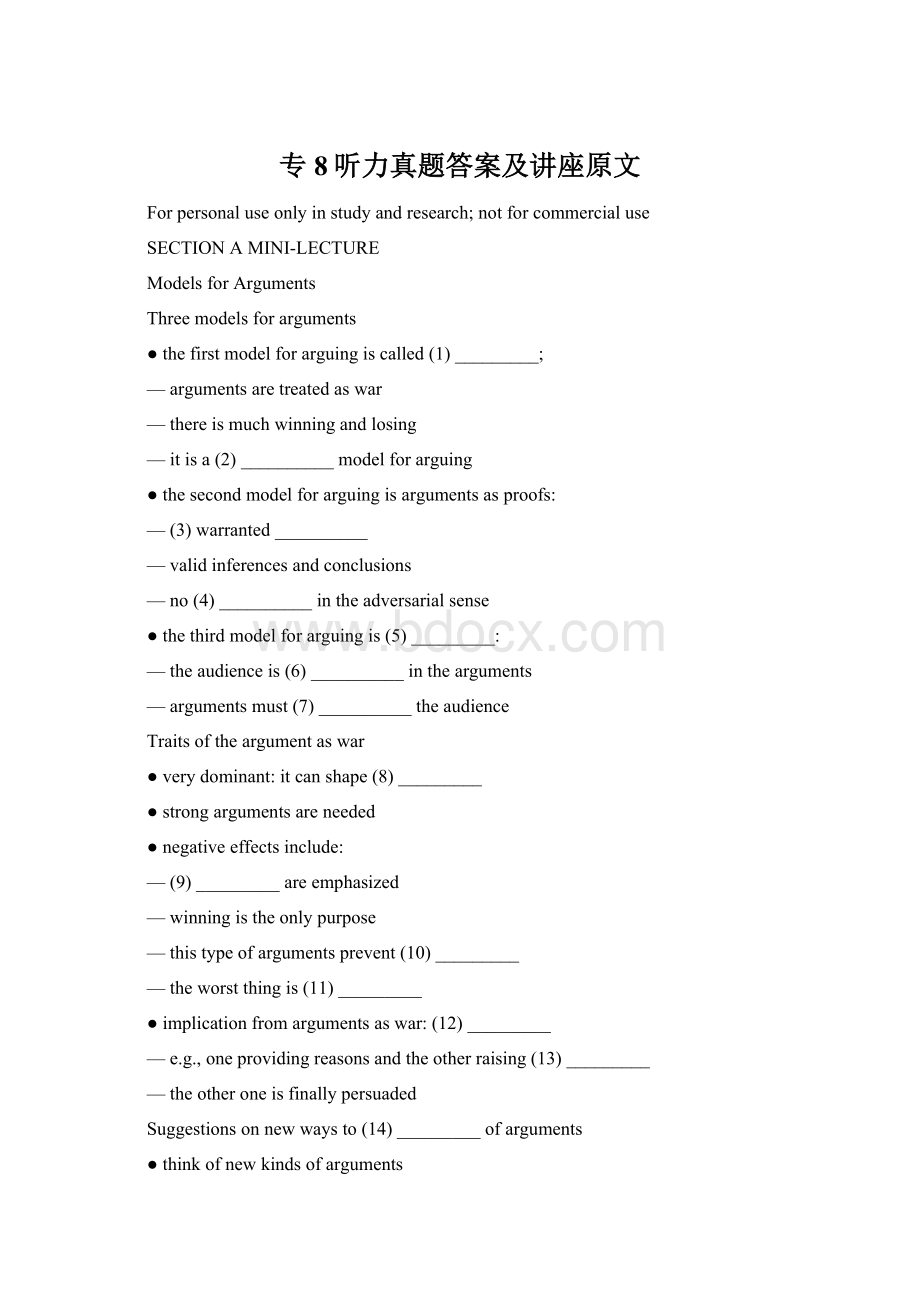专8听力真题答案及讲座原文.docx
《专8听力真题答案及讲座原文.docx》由会员分享,可在线阅读,更多相关《专8听力真题答案及讲座原文.docx(5页珍藏版)》请在冰豆网上搜索。

专8听力真题答案及讲座原文
Forpersonaluseonlyinstudyandresearch;notforcommercialuse
SECTIONAMINI-LECTURE
ModelsforArguments
Threemodelsforarguments
●thefirstmodelforarguingiscalled
(1)_________;
—argumentsaretreatedaswar
—thereismuchwinningandlosing
—itisa
(2)__________modelforarguing
●thesecondmodelforarguingisargumentsasproofs:
—(3)warranted__________
—validinferencesandconclusions
—no(4)__________intheadversarialsense
●thethirdmodelforarguingis(5)_________:
—theaudienceis(6)__________inthearguments
—argumentsmust(7)__________theaudience
Traitsoftheargumentaswar
●verydominant:
itcanshape(8)_________
●strongargumentsareneeded
●negativeeffectsinclude:
—(9)_________areemphasized
—winningistheonlypurpose
—thistypeofargumentsprevent(10)_________
—theworstthingis(11)_________
●implicationfromargumentsaswar:
(12)_________
—e.g.,oneprovidingreasonsandtheotherraising(13)_________
—theotheroneisfinallypersuaded
Suggestionsonnewwaysto(14)_________ofarguments
●thinkofnewkindsofarguments
●changerolesinarguments
●(15)_________
SECTIONBINTERVIEW
Now,listentothePartOneoftheinterview.Questions1to5arebasedonPartOneoftheinterview.
1.Whatisthetopicoftheinterview?
A.Maggie’suniversitylife.B.Hermom’slifeatHarvard.C.Maggie’sviewonstudyingwithMom.D.Maggie’sopiniononhermom’smajor.
2.Whichofthefollowingindicatesthattheyhavethesamestudyschedule?
A.Theytakeexamsinthesameweeks.B.Theyhavesimilarlecturenotes.C.Theyapplyforthesameinternship.D.Theyfollowthesamefashion.
3.Whatdothemotherandthedaughterhaveincommonasstudents?
A.Havingroommates.B.Practicingcourttrails.C.Studyingtogether.D.Takingnotesbyhand.
4.WhatisthebiggestadvantageofstudyingwithMom?
A.Protection.B.Imagination.C.Excitement.D.Encouragement.
5.WhatisthebiggestdisadvantageofstudyingwithMom?
A.ThinkingofwaystocomfortMom.B.OccasionalinterferencefromMom.C.UltimatelycallswhenMaggieisbusy.D.FrequentcheckonMaggie’sgrades.
Now,listentothePartTwooftheinterview.Questions6to10arebasedonPartTwooftheinterview.
6.Whyisparentandkidstudyingtogetheracommoncase?
A.Becauseparentsneedtobereadyfornewjobs.B.Becauseparentslovetoreturntocollege.C.Becausekidsrequiretheirparentstodoso.D.Becausekidsfindithardtoadapttocollegelife.
7.WhatwouldMaggie’smomliketobeaftercollege?
A.Realestateagent.B.Financier.C.Lawyer.D.Teacher.
8.HowdoesMaggie’smomfeelaboutsittinginclassafter30years?
A.Delighted.B.Excited.C.Bored.D.Frustrated.
9.WhatismostchallengingforMaggie’smom?
A.Howtomakeacake.B.Howtomakeomelets.C.Toacceptwhatistaught.D.Toplanafuturecareer.
10.HowdoesMaggiedescribetheprocessofthinkingoutone’scareerpath?
A.Unsuccessful.B.Gradual.C.Frustrating.D.Passionate.
Keys:
1.thedialecticalmodel
2.commonandfixed
3.premises
4.opposition/arguing
5.argumentsasperformances/therhetoricalmodel
6.participatory/participating/theparticipant/takingpart
7.betailoredto/caterfor
8.howweargue/ouractualconduct
9.tactics/strategies
10.negotiationandcollaboration
11.there’snosolution/progress
12.learningwithlosing
13.questions/counter-considerations/counter-arguments/objections/argumentsinopposition
14.achievepositiveeffects
15.supportoneself/yourself
CADDB
ACDCB
Script:
Goodmorning,everyone.MynameisDavidandIamgoodatarguing.Sowelcometoourintroductorylectureonargumentation.Whydowewanttoargue?
Whydowetrytoconvinceotherpeopletobelievethingsthattheydon’twanttobelieve?
Andisthatevenanicethingtodo?
Isthatanicewaytotreatotherhumanbeing,tryandmakethemthinksomethingtheydon’twanttothink?
Well,myanswerisgoingtomakereferencetothreemodelsforarguments.
(1)Thefirstmodel—let’scallthisthedialecticalmodel—isthatwethinkofargumentsaswar.Andyouknowwhatthat’slike.Thereisalotofscreamingandshoutingandwinningandlosing.
(2)Andthat’snotreallyaveryhelpfulmodelarguing,butit’saprettycommonandfixedone.Iguessyoumusthaveseenthattypeofarguingmanytimes—inthestreet,onthebusorinthesubway.
Let’smoveontothesecondmodel.Thesecondmodelforarguingregardsargumentsasproofs.Thinkofamathematician’sargument.Here’smyargument.Doesitwork?
Isitanygood?
(3)Arethepremises(前提)warranted?
Aretheinferences(推论))valid?
Doestheconclusionfollowthepremises?
(4)Noopposition,noadversariality(对抗)—notnecessarilyanyarguingintheadversarialsense.
(5)Andthere’sathirdmodeltokeepinmindthatIthinkisgoingtobeveryhelpful,andthatisargumentsasperformances,argumentsasbeinginfrontofanaudience.Wecanthinkofapoliticiantryingtopresentaposition,tryingtoconvincetheaudienceofsomething.
Butthere’sanothertwist(转折)onthismodelthatIreallythinkisimportant;namely,thatwhenwearguebeforeanaudience,(6)sometimestheaudiencehasamoreparticipatoryroleintheargument;thatis,youpresentyouargumentsinfrontofanaudiencewhoarelikejuries(陪审团)thatmakeajudgmentanddecidethecase.(5)Let’scallthismodeltherhetoricalmodel,(7)whereyouhavetotailor(迎合)yourargumenttotheaudienceathand.
Ofthosethree,theargumentaswaristhedominantone.Itdominateshowwetalkaboutarguments,itdominateshowwethinkaboutarguments,andbecauseofthat,(8)itshapeshowweargue,ouractualrightontarget.Wewanttohaveourdefensesupandourstrategiesallinorder.Wewantkillerarguments.That’sthekindofargumentwewant.Itisthedominantwayofthinkingaboutarguments.WhenI’mtalkingaboutarguments,that’sprobablywhatyouthoughtof,theadversarialmodel.
Butthewarmetaphor,thewarparadigm(范例)ormodelforthinkingaboutarguments,has,Ithink,negativeeffectsonhowweargue.(9)First,itelevatestacticsoversubstance.Youcantakeaclassinlogicargumentation.Youlearnallaboutthestrategiesthatpeopleusetotryandwinargumentsandthatmakesarguingadversarial;it’spolarizing(分化的).Andtheonlyforeseeableoutcomesaretriumph—glorioustriumph—ordisgraceful(可耻的)defeat.Ithinkthoseareverydestructiveeffects,andworstofall,(10)itseemstopreventthingslikenegotiationandcollaboration(合作).Um,Ithinktheargument-as-warmetaphorinhibits(阻止)thoseotherkindsofresolutionstoargumentation.
(11)Andfinally—thisisreallytheworstthing—argumentsdon’tseemtogetusanywhere;they’redeadends(死胡同).Wedon’tanywhere.Oh,andonemorething.(12)Thatis,ifargumentiswar,thenthere’salsoanimplicit(绝对的)aspectofmeaning—learningwithlosing.
AndletmeexplainwhatImean.SupposeyouandIhaveanargument.Youbelieveaproposition(命题)andIdon’t.AndIsay,“Well,whydoyoubelievethat?
”Andyougivemeyourreasons.AndIobjectandsay,“Well,whatabout…?
”AndIhaveaquestion:
“Well,whatdoyoumean?
Howdoesitapplyoverhere?
”Andyouanswermyquestion.Now,supposeattheendoftheday,I’veobjected,I’vequestioned,(13)I’veraisedallsortsofquestionsfromanoppositeperspectiveandineverycaseyou’verespondedtomysatisfaction.Andsoattheendoftheday,Isay,“Youknowwhat?
Iguessyou’reright.”MaybefinallyIlostmyargument.Butisn’titalsoaprocessoflearning?
Soyouseeargumentsmayalsohavepositiveeffects.
(14)So,howcanwefindnewwaystoachievethosepositiveeffects?
Weneedtothinkofnewkindsofarguments.HereIhavesomesuggestion.Ifwewanttothinkofnewkindsofargument,whatweneedtodoisthinkofnewkindsofarguers—peoplewhoargue.
Sotrythis:
Thinkofalltherolesthatpeopleplayinarguments.
(1)(5)There’stheproponentandtheopponentinanadversarial,dialecticalargument(对话式论证).There’stheaudienceinrhetoricalarguments.There’sthereasonerinargumentsasproofs.Allthesedifferentroles.Now,canyouimagineanargumentinwhichyouarethearguer,butyou’realsointheaudience,watchingyourselfargue?
Canyouimagineyourselfwatchingyourselfargue?
(15)Thatmeansyouneedtobesupportedbyyourself.Evenwhenyoulosetheargument,still,attheendoftheargument,youcouldsay,“Wow,thatwasagoodargument!
”Canyoudothat?
Ithinkyoucan.Inthisway,you’vebeensupportedbyyourself.
Uptillnow,Ihavelostalotofarguments.Itreallytakespracticetobecomeagoodarguer,inthesenseofbeingabletobenefitfromlosing,butfortunately,I’vehadmany,manycolleagueswhohavebeenwillingtostepupandprovidethatpracticeforme.
Ok.Tosumup,intoday’slecture,Ihaveintroducedthreemodelsofarguments.
(1)Thefirstmodeliscalledthedialecticalmodel.Thesecondoneisthemodelofargumentsasproofs.(5)Andthelastoneiscalledtherhetoricalmodel,themodelofargumentsasperformances.Ihavealsoemphasizedthat,thoughtheadversarialtypeofargumentsisquitecommon,wecanstillmakeargumentsproducesomepositiveeffects.NexttimeIwillcontinueourdiscussionontheprocessofarguing.
仅供个人用于学习、研究;不得用于商业用途。
Forpersonaluseonlyinstudyandresearch;notforcommercialuse.
NurfürdenpersönlichenfürStudien,Forschung,zukommerziellenZweckenverwendetwerden.
Pourl'étudeetlarechercheuniquementàdesfinspersonnelles;pasàdesfinscommerciales.
толькодлялюдей,которыеиспользуютсядляобучения,исследованийинедолжныиспользоватьсявкоммерческихцелях.
以下无正文
仅供个人用